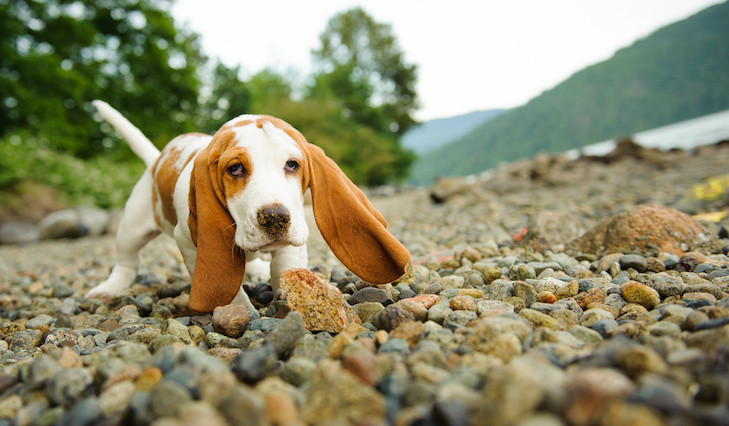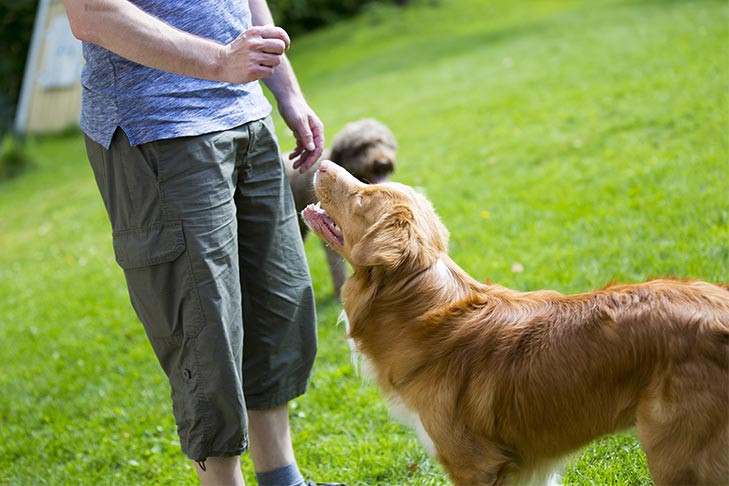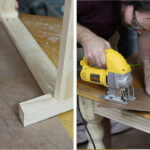Is your dog’s rock-eating habit a cause for concern? Yes, it can be! This article from rockscapes.net will help you understand the reasons behind this behavior, from nutritional deficiencies to boredom, and provide practical solutions to stop it, ensuring your dog’s health and safety in your beautiful, rock-enhanced landscape. Explore our website for inspiring landscape ideas and the perfect stones for your yard, all while keeping your furry friend safe. Dive into the world of canine pica, understand the role of pet enrichment, and learn crucial “leave it” command techniques to keep your dog safe!
1. Why is My Dog Eating Rocks?
Your dog eating rocks could signal medical, behavioral, or psychological issues. Often, it’s linked to pica, an eating disorder arising from nutritional deficiencies. Other potential causes include undiagnosed medical conditions like canine diabetes, internal parasites, worms, or even tumors. For puppies, chewing rocks might be a way to alleviate teething pain.
 Alt Text: Basset Hound puppy curiously exploring a rocky beach, highlighting potential ingestion hazard
Alt Text: Basset Hound puppy curiously exploring a rocky beach, highlighting potential ingestion hazard
Beyond health, boredom and seeking attention are significant factors. As Mindy Tusko, a dog trainer at Pawsitive Results Training, explains, dogs explore their environment much like human babies, and may chew rocks out of curiosity or boredom.
To understand your dog’s behavior better, consider these potential reasons in more detail:
- Nutritional Deficiencies: Pica often stems from a lack of essential nutrients in the diet.
- Underlying Medical Issues: Diabetes, parasites, or tumors can trigger unusual eating habits.
- Teething Pain: Puppies may chew on rocks to soothe their gums.
- Attention-Seeking: Your dog might be trying to get your attention.
- Boredom: Lack of mental and physical stimulation can lead to destructive behaviors like rock eating.
- Curiosity: Exploring through taste and smell is a natural behavior for dogs.
Remember, addressing this behavior is vital for your dog’s health. Contact rockscapes.net for advice on creating a safer and more engaging outdoor environment for your pet.
2. What are the Dangers of Dogs Eating Rocks?
Eating rocks can cause serious health issues for your dog, including:
- Intestinal Blockages: Rocks can obstruct the digestive tract, requiring surgery.
- Digestive Issues: Damage to teeth, esophagus, and intestines can occur.
- Choking Hazards: Small rocks can lead to choking, which can be fatal.
- Dental Damage: Chewing on hard rocks can break or wear down teeth.
Addressing the root cause and preventing rock consumption is key to your dog’s well-being.
3. How Can I Stop My Dog From Eating Rocks?
Here’s how to train your dog to stop eating rocks, from commands to mental exercises.
3.1. Teach Essential Commands: “Leave It” and “Drop It”
These commands are crucial for preventing your dog from eating rocks. Use a calm but firm tone when telling your dog to “drop it” if they have a rock in their mouth. The “leave it” command helps prevent them from picking up rocks in the first place.
“Those [commands] are so highly beneficial,” says Tusko. “It could be life-saving for the dogs.”
 Alt Text: Nova Scotia Duck Tolling Retriever attentively participating in obedience training session in the park
Alt Text: Nova Scotia Duck Tolling Retriever attentively participating in obedience training session in the park
Here’s how to implement these commands:
- “Leave It”: When your dog shows interest in a rock, say “leave it.” Redirect their attention with a toy or treat. Avoid yelling, as it may cause them to swallow the rock quickly.
- “Drop It”: If your dog has a rock in their mouth, calmly say “drop it.” Reward them with praise or a treat when they release the rock.
- Positive Reinforcement: Use physical or verbal praise in addition to treats. Affection can be a powerful reward for dogs.
3.2. Enrich Their Environment
Boredom is a major reason why dogs eat rocks. Provide plenty of mental and physical stimulation:
- Rotate Toys: Keep your dog interested by regularly switching out their toys.
- Interactive Games: Engage in activities like fetch, tug-of-war, or hide-and-seek.
- Dog Sports: Consider activities like Agility or Herding to provide a positive outlet for their energy.
- Training Programs: Enroll in a program like Canine Good Citizen (CGC) to teach basic obedience and provide mental stimulation. Contact your local AKC club to get started in dog sports or classes.
3.3. Supervise Outdoor Activities
Always supervise dogs in the backyard or dog park, especially if they have a history of eating rocks. Provide chew toys to occupy their time and prevent boredom.
4. What Should I Do If My Dog Eats a Rock?
If your dog eats a rock, take these steps:
- Contact Your Veterinarian: Schedule an appointment to check for underlying health conditions or nutritional deficiencies.
- Monitor Your Dog: Watch for signs of distress, such as vomiting, loss of appetite, or difficulty defecating.
- Follow Vet’s Recommendations: Your vet may recommend special diets, medication, or further tests.
5. Could Pica Be the Reason?
Pica is an eating disorder characterized by the consumption of non-food items. If your vet suspects pica, they may recommend specialized training with a professional animal behaviorist.
6. How Can I Ensure My Dog Gets Proper Nutrition?
Proper nutrition is critical to prevent pica and other health issues. Here are some tips:
- Balanced Diet: Feed your dog a high-quality, balanced diet that meets their nutritional needs.
- Supplements: Consult your vet about adding supplements to address any deficiencies.
- Avoid Table Scraps: Table scraps can unbalance your dog’s diet and lead to digestive issues.
- Regular Check-ups: Regular vet visits can help identify and address nutritional deficiencies early.
7. How Can I Create a Safe Rock Landscape for My Dog?
If you love the look of rockscapes but worry about your dog, consider these safety measures:
- Choose Larger Rocks: Opt for rocks too large for your dog to swallow.
- Secure Rocks: Ensure rocks are stable and won’t easily be dislodged for chewing.
- Create Barriers: Use fencing or plants to create barriers around rock features.
- Supervise: Always supervise your dog when they’re near rock features.
- Consider Alternatives: Explore alternatives to traditional rockscapes, such as using dog-friendly plants or creating a designated play area.
Rockscapes.net offers a wide variety of landscaping stones that are too big for dogs to swallow, ensuring peace of mind while maintaining a beautiful outdoor space.
8. How Does Boredom Impact My Dog’s Behavior?
Boredom can significantly impact your dog’s behavior. Dogs need mental and physical stimulation to stay happy and healthy. Without it, they may develop destructive behaviors like eating rocks.
“Boredom is a big problem,” says Tusko, “One of the reasons that we do find dogs are eating rocks is because [they] have nothing else to do.”
How to Combat Boredom
- Daily Walks: Regular walks provide exercise and mental stimulation.
- Interactive Toys: Toys that require problem-solving can keep your dog engaged.
- Training Sessions: Short training sessions can provide mental stimulation and strengthen your bond.
- Socialization: Allow your dog to interact with other dogs and people to prevent isolation and boredom.
9. What Role Does Anxiety Play in Rock Eating?
Anxiety can also contribute to rock eating in dogs. Anxious dogs may engage in destructive behaviors to cope with stress.
Alt Text: Anxious-looking dog displaying signs of stress, potentially linked to destructive behaviors like rock consumption
Managing Anxiety
- Identify Triggers: Determine what situations or environments trigger your dog’s anxiety.
- Create a Safe Space: Provide a comfortable and secure area where your dog can retreat when feeling anxious.
- Behavioral Therapy: Consult a professional dog trainer or behaviorist to develop strategies for managing anxiety.
- Medication: In severe cases, your vet may prescribe medication to help manage anxiety.
10. How Can Rockscapes.net Help Me Create a Dog-Friendly Landscape?
At rockscapes.net, we understand the importance of creating beautiful and safe outdoor spaces for both you and your pets. Here’s how we can help:
- Safe Stone Selection: We offer a wide range of large decorative stones that are too big for most dogs to swallow, minimizing the risk of ingestion.
- Design Ideas: Our website features numerous landscape design ideas that incorporate rocks safely and creatively, ensuring your dog’s well-being.
- Expert Advice: Our team of experts can provide advice on creating dog-friendly landscapes that meet your specific needs and preferences.
- Installation Services: We offer professional installation services to ensure your rock features are secure and stable.
We’re here to provide guidance and inspiration for your landscape projects.
Intent Map
To give the best possible answers, I have looked at the intent behind the search term.
| Search Intent | Description |
|---|---|
| Identify the Cause | Users want to understand why their dog is eating rocks, whether it’s behavioral, dietary, or medical. |
| Health Implications | Users want to know the potential dangers of rock eating for their dog’s health, such as blockages or dental damage. |
| Behavioral Solutions | Users are looking for practical tips to stop their dog from eating rocks through training, activities, and supervision. |
| Nutritional Information | Users seek advice on ensuring their dog has proper nutrition to address underlying deficiencies that cause rock eating. |
| Safe Landscaping Options | Users want ideas on how to create a safe rock landscape for their dog. |
FAQ
1. What is pica in dogs?
Pica in dogs is an eating disorder that causes them to consume non-food items, often due to nutritional deficiencies or underlying medical issues. Consult your vet for diagnosis and treatment.
2. How do I teach my dog the “leave it” command?
To teach “leave it,” start by placing a treat in your hand and saying “leave it.” If your dog tries to get the treat, close your hand. When they stop, reward them with a different treat from your other hand.
3. What are the signs of intestinal blockage in dogs?
Signs of intestinal blockage include vomiting, loss of appetite, abdominal pain, and difficulty defecating. Contact your vet immediately if you notice these symptoms.
4. Can boredom really cause my dog to eat rocks?
Yes, boredom can lead to destructive behaviors like eating rocks. Ensure your dog gets enough mental and physical stimulation through exercise, toys, and training.
5. What kind of toys are best for preventing boredom in dogs?
Interactive toys, puzzle toys, and chew toys are great for preventing boredom. Rotate toys regularly to keep your dog interested.
6. How often should I take my dog to the vet for check-ups?
Annual check-ups are recommended for adult dogs, and twice-yearly check-ups for senior dogs. Regular vet visits can help identify and address health issues early.
7. Are some dog breeds more prone to eating rocks?
While any dog can develop this behavior, breeds with high energy levels and those prone to anxiety may be more likely to eat rocks.
8. What should I do if my puppy is eating rocks?
Puppies often explore with their mouths, but rock eating can be dangerous. Supervise your puppy closely, provide appropriate chew toys, and teach the “leave it” command.
9. Can anxiety medication help with rock eating?
If anxiety is the underlying cause, your vet may prescribe medication to help manage your dog’s anxiety and reduce destructive behaviors.
10. Where can I find dog-safe landscaping ideas?
Rockscapes.net offers a variety of dog-safe landscaping ideas, including tips on selecting large decorative stones and creating secure rock features. Visit our website for inspiration and expert advice!
Address: 1151 S Forest Ave, Tempe, AZ 85281, United States
Phone: +1 (480) 965-9011
Website: rockscapes.net.
Note: While Arizona State University’s School of Earth and Space Exploration is an excellent source for geological information, there is no research from there about this topic.
